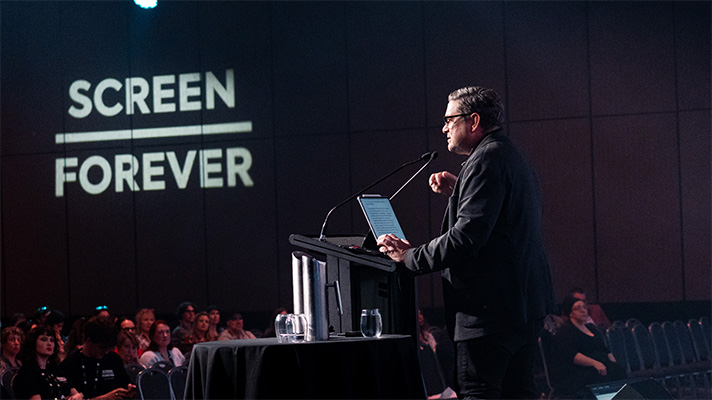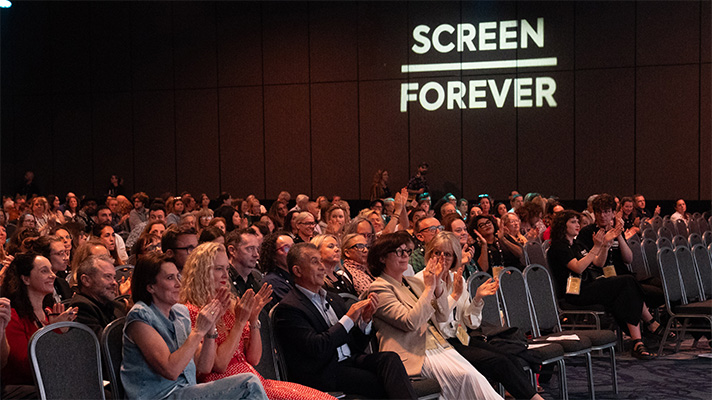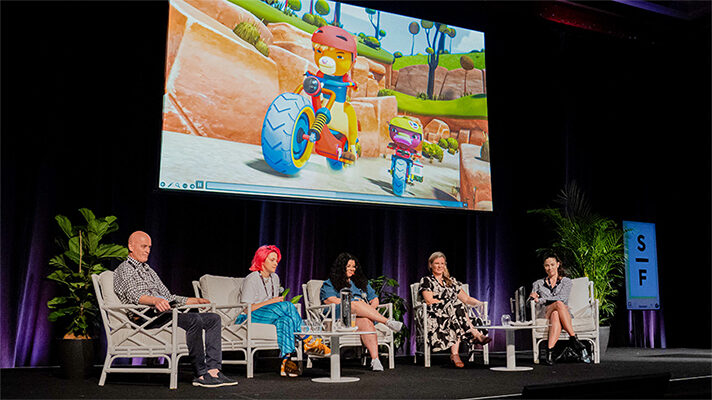We should be here, there and everywhere – impressions from Screen Forever 2025
Francisca Hoffmann-Axthelm and Andrew Jankovic
16 May 2025
By Francisca Hoffmann-Axthelm and Andrew Jankovic, ACTF legal
With over 1,000 delegates from Australia and overseas, the Screen Forever conference, presented by Screen Producers Australia (SPA), is the juggernaut in the Australian screen industry’s calendar. It offers a singular opportunity for robust discussion, learning, networking, pitching and socialising for established and emerging practitioners.
This year, the ACTF legal team had the opportunity to be part of the ACTF delegation at the 39th Screen Forever on the Gold Coast. Alongside the ACTF development managers and CEO Jenny Buckland, we took part in round tables, pitches and various other content-related meetings. We all sponged up as much thought-provoking content as possible and met with many producers, distributors, entertainment lawyers, regulators and agencies.
It is not news that the Australian screen industry is experiencing volatility and disruption. Broadcasters and producers alike are fighting for survival in a world in which the US streamers dominate. With the federal election freshly out of the way, there was a sense of relief that SPA and its members are now able to get on with advocating its policy platform, which includes local content quotas for streamers, terms of trade and discoverability issues. As if to illustrate the fraught world we operate in, a new issue lobbed right at the start of the conference, with the US President announcing plans to introduce 100% tariffs on movies not made in the USA, greeted with a mixture of anxiety and disbelief.
Conference themes
The importance of culturally authentic Australian content – creating it, owning it and keeping it -was a theme running through the entire conference. There were also calls for more regulatory assistance to address power imbalances and market challenges, alongside the call for the urgent introduction of quotas for Australian content on streamers. The rise of YouTube and the strategies needed to cut through on digital online content platforms was discussed in multiple sessions as well as over morning and afternoon tea.

Australian content
In the Hector Crawford Memorial Lecture, Wesley Enoch AM made an eloquent case for cultural sovereignty in an age where US streaming platforms, fractured audiences and algorithms dictate the stories we get to see. He acknowledged that we are global citizens and digital natives, but suggested we should hold on to Hector Crawford’s core idea: that a strong, complex, independent nation must tell its own stories.
“Because here’s the thing — when we fail to tell stories, someone else tells them for us. And too often, they reflect their cultural goals and ambitions. They simplify and deny difference. Stereotype and weaken the specific. Silence. And I think of us — First Nations storytellers, marginalised voices, communities still fighting to be seen — and how Hector’s legacy gives us a model. Not a perfect one. But a powerful one. He didn’t wait for permission. He built the platforms. Trained the teams. Made the case. Again and again and again. That’s what legacy really is. Not what you leave behind — but what you set in motion.”
It’s not as if Australians don’t want to enjoy their own stories – during the State of Play session, Stan shared that five of Stan’s top 10 programmes in 2024 were Australian.
Government Intervention
One of the threads running through the conference was a desire for government intervention to address inequalities and power imbalances in the screen industry. SPA Council Chair Kate Carnell pointed out that most independent film producers are relatively small entities constantly dealing with bigger counterparts, which leads to lop-sided negotiations and less-than-ideal deal terms.
Looking overseas, the New Zealand offset model was considered as a lever to incentivise the creation of local IP. During the Reboots vs Originals session, the panel highlighted how foreign formats produced in Australia potentially take commissioning slots away from original productions with local IP (which can then go on to be sold internationally and thus create sustainable business models) and pointed out that in New Zealand productions based on foreign IP can access a 20% tax rebate, compared to 40% when the IP was created in New Zealand.
Discoverability was another hot topic. In the UK, YouTube is being lobbied to prioritise local content for children, giving children the option to engage with UK-made content before being shown global content. The same approach could be advocated for in Australia, so that children have a choice to watch local content, rather than just what the global algorithm is pushing them.

YouTube
Several sessions addressed the strategies for succeeding on platforms like YouTube. In these sessions established producers were keen to listen and learn from successful YouTubers who have made this space their own.
Panel members in the sessions Screen Time Savvy: Cracking the Code to Reach Kids in the Digital Playground and Everything’s Online: The Digital Hustle and How to Stay Ahead were aligned in their approach to thriving on digital platforms: having a presence on YouTube is not simply ‘nice to have’ – it is a necessity to building an audience and a sustainable brand. As Lee Naimo from Haven’t You Done Well Productions explained, it’s not always about the money on YouTube. Content on YouTube is a “shop window”, building audiences and fan engagement in content that might go on to be monetised via live shows, merchandise and broadcast commissions. Meanwhile Canadian children’s producer Carla De Jong from Sinking Ship explained that having sample episodes of a show on YouTube, or shortform or other content connected to the show, can build recognition and help funnel the audience to the broadcaster. Carla suggested that broadcasters and producers in multiple territories might ALL share the same YouTube content to their followers in a collective effort to drive viewers towards the show.
These sessions signalled that the rulebooks are being re-written. Broadcasters and streaming platforms might not be served best by holding onto exclusive rights. It makes sense to enable multiple pathways to discovery and allow producers to build their brands and followings. And an industry that has been notoriously hard for newcomers to break into might be opening its doors – because established producers need the knowledge and perspective that digital natives bring.
There is a world of possibilities. If we can retain our cultural sovereignty.

Comments
Comments for this post are open.